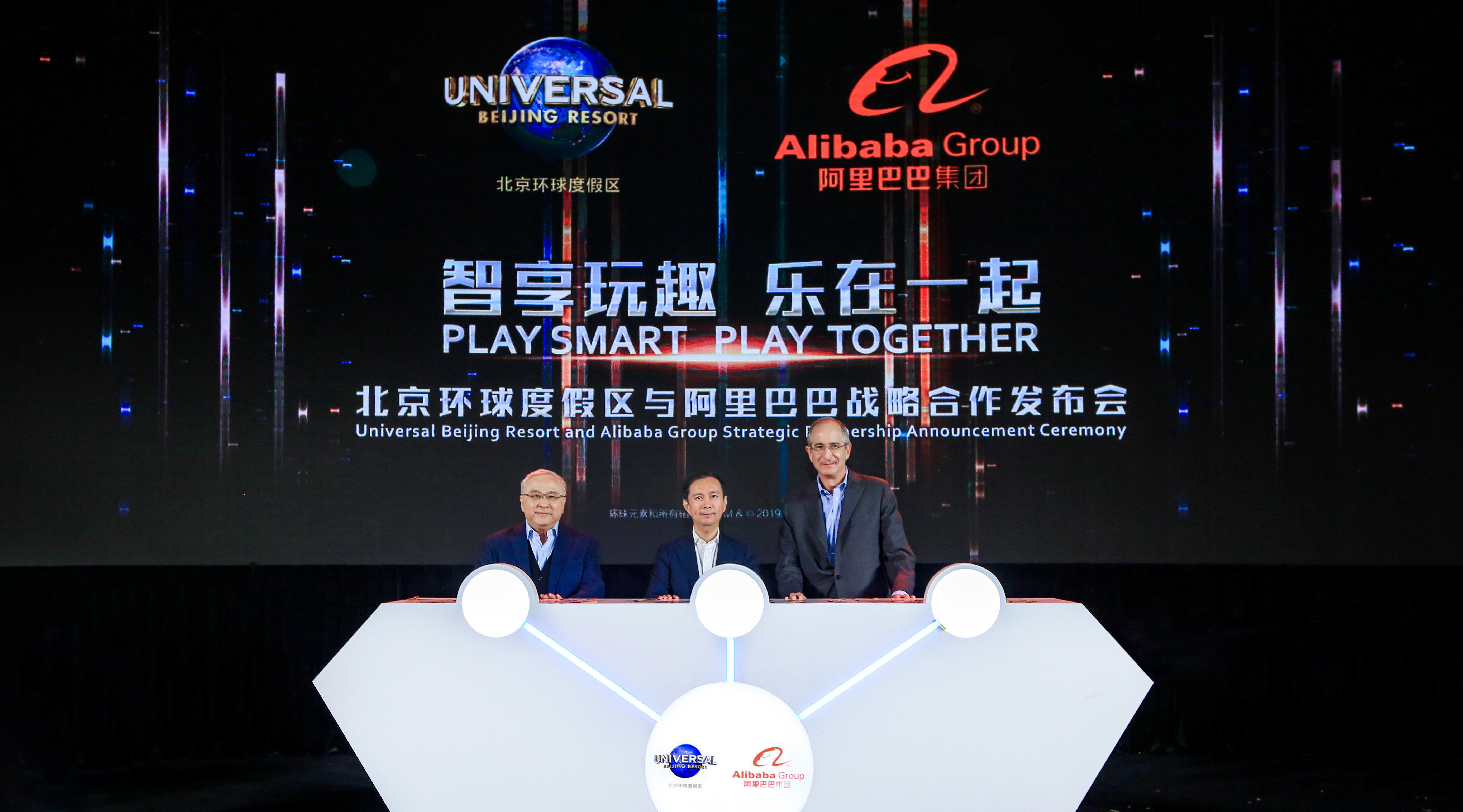


Universal Parks & Resorts has partnered with Alibaba Group to enhance the visitor experience and digitize operations at what will be its newest theme park, Universal Beijing Resort, which is set to open in 2021.
From facial-recognition entry to app-based food ordering and more, Universal Beijing will leverage the Alibaba Business Operating System to deliver a more-seamless and convenient park visit, the companies said Thursday at a press conference in Beijing. ABOS offers all of Alibaba’s tools and services to companies so that they can better meet the pace and demands of the China market.
Brian Roberts, chairman and CEO of U.S. media and entertainment company Comcast, which owns Universal Studios, said the park experience is about more than just rides and attractions. It’s also important to make sure Universal makes it fun and easy for our guests to enjoy their time with family and friends, he said.
“Our partnership with Alibaba will help us do exactly that. Together, we can take the theme park experience to a new level,” Roberts said.
The experience begins even before people leave their homes, as visitors will be able to book tickets and hotels via the Universal Beijing flagship store on Fliggy, Alibaba’s online travel platform. They can also watch resort-related programming and Universal movies on Alibaba’s video-streaming app Youku.
Once they’ve arrived at the resort, they have the option of using Alipay‘s facial-recognition technology for everything from park entry and storage lockers to express-lane access and paying for meals and park merchandise. Alibaba and Universal Beijing are also exploring ways to use Alipay mini-programs to enhance the guest experience, such as for trip-planning or parking, as well as encouraging low-carbon lifestyle choices – such as ticketless entry and digital payments – that translate to “green energy” points in Alipay Ant Forest, a go-green mini-program on the app.
Visitors can use the local-services app Koubei to get personalized food and beverage recommendations and use its online meal-ordering function to cut waiting time. Alibaba’s cloud-computing arm will support the technology infrastructure underpinning the resort experience, while its B2C e-commerce platform Tmall will work with Universal Beijing Resort to roll out co-marketing campaigns.
The companies, who also partner with Beijing Tourism Group, expect the collaboration to offer “the ultimate guest experience” and set a new benchmark for the entertainment and theme park industry globally, a release said.
Alibaba Group Executive Chairman and CEO Daniel Zhang said he hopes the collaboration will offer an experience that is “unmatched anywhere.”
“This partnership will also bring to fruition a multidimensional, data-enabled operations-management solution for the industry and create a truly digitized theme park,” he said. “The future of commerce is driven by technology and big data, and digitization will be the source of brand-new growth opportunities for all businesses.”
The Alibaba Business Operating System program is a one-stop-shop solution that helps brands make use of all the tools available across the company’s ecosystem, spanning marketing and branding, sales, product development, customer services, finance, logistics, supply chain and channel management and on-demand local services. Starbucks, for example, has tapped ABOS to streamline its workflow with the e-commerce giant. It works with a designated team at Alibaba, who serve as a single-contact communication point for the company and help provide timely troubleshooting and consultation for the Seattle-based coffee chain.
In 2017, Starbucks’s cafes began accepting mobile wallet Alipay for payment. In December of the same year, Starbucks opened its first roastery outside of its home market in Shanghai, which featured mobile technology and augmented-reality experiences designed by Alibaba. It has since worked with Tmall and Taobao to expand its online retail presence by opening a virtual store, as well as leveraged Ele.me, Alibaba’s on-demand local service for delivery, and the New Retail-driven grocery chain Freshippo to enhance its delivery speed and reach. More recently, it worked with Alibaba A.I. Labs to allow coffee-lovers to order food and beverages using the Tmall Genie smart speaker and have them delivered within 30 minutes.
Other brands that have tapped the ABOS service package include P&G or Nestle, which works with Alibaba business units ranging from Tmall, Rural Taobao, Cainiao, Lingshoutong to Freshippo.





